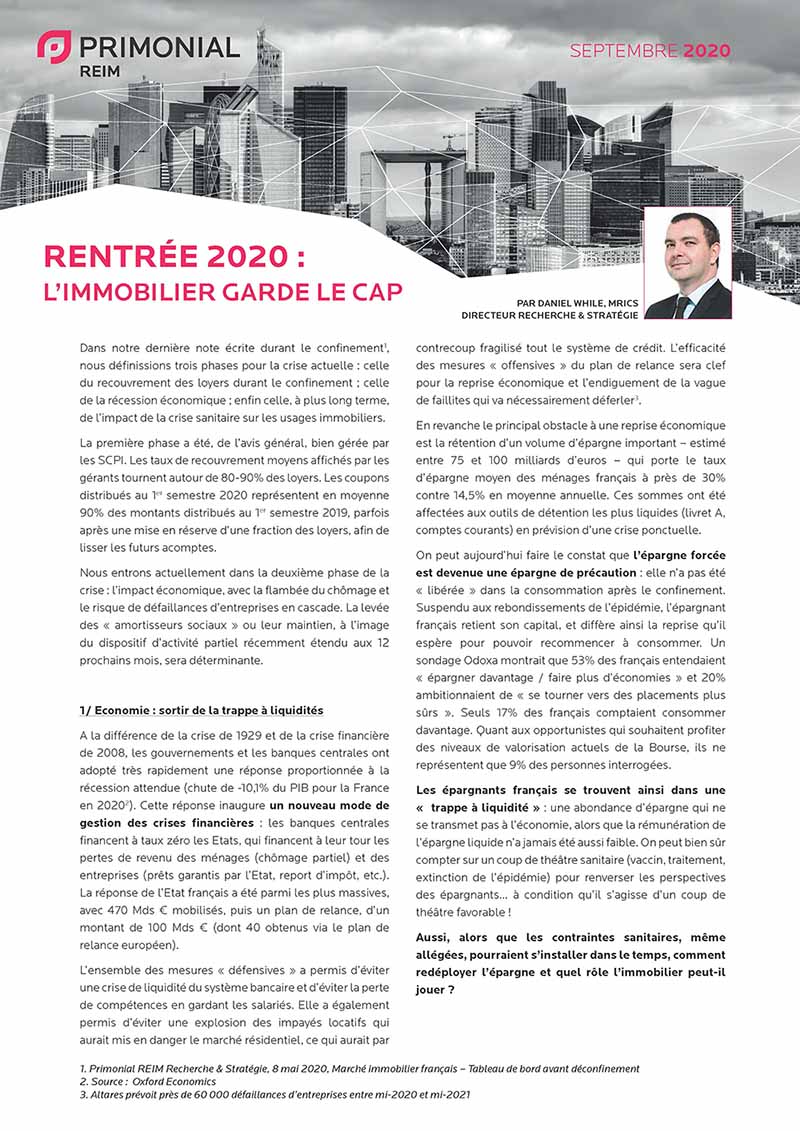- Home
- Studies and research
- Fall 2020 : Real Estate Keeps on track
Fall 2020 : Real estate keeps on track
september 2020
In our last report, written during the lock-down1, we said that the current crisis would be composed of three phases: rent collection during lockdown; the economic recession; and lastly the longer term impact of the COVID-19 crisis on the real estate sector.
The general consensus is that French real estate investment companies (SCPIs) have handled the first phase pretty well, with fund managers posting average rent collection rates of 80 to 90%. Dividends paid in the first half of 2020 were on average 90% of those paid in H1 2019, with a portion of rents sometimes set aside as a reserve for future payments.
We are now entering the second phase of the crisis, i.e. its economic impact, with soaring unemployment and the risk of a cascade of business closures. One decisive factor will be whether or not welfare compensations will be maintained, as was the French government’s subsidised partial unemployment scheme, which was recently extended for another 12 months.
How can savings be redeployed and what role can real estate play if crisis constraints need to be
maintained for an extended period, even if less severe?

The team

Henry-Aurélien Natter joined Praemia REIM as Research Manager in January 2018. He has the mission of developing the analyses of the Research & Strategy Department on the real estate markets, the economy and capital in France and in Europe.
Henry-Aurélien Natter began his career at Les Echos Etudes (formerly Eurostaf), then at C&W (formerly DTZ), and lastly at BNP PRE, where he acquired solid and varied experience in real estate research, strategy and finance. He is qualified with an AES degree in Business Management, a Masters Decree in management and SME management, and an International Master in commerce and marketing.
You may also like

- Thematic study
Immobilier de santé : la démographie européenne au coeur des enjeux de demain
Le vieillissement rapide de la population et la pression démographique créent des besoins structurels sur les systèmes de santé européens. Pour y répondre, des investissements massifs sont nécessaires, tant pour développer de nouvelles capacités d’accueil que pour moderniser une partie du parc immobilier devenue obsolète (maisons de retraite médicalisées, hôpitaux, cliniques, etc.).

- Thematic study
Convictions Immobilières - 1 Trimestre 2025
Alors que l’économie mondiale semblait avoir retrouvé une certaine stabilité, les incertitudes se sont renforcées lorsque l’administration américaine a fait le choix d’augmenter les droits de douane vis-à-vis du reste du monde, conduisant les marchés boursiers en zone de turbulences. Des négociations sont en cours pour trouver des solutions.

- Market review
Real Estate Convictions : Q4 2024
The continued reduction in ECB interest rates, the level of savings amongst Europeans and the recovery of the real estate markets between 2022 and 2024 all point to the potential for improvement and a rebound in the sector.


 et Firefox
et Firefox 